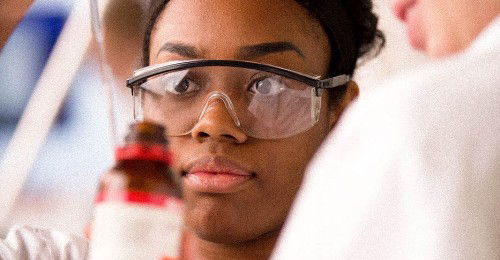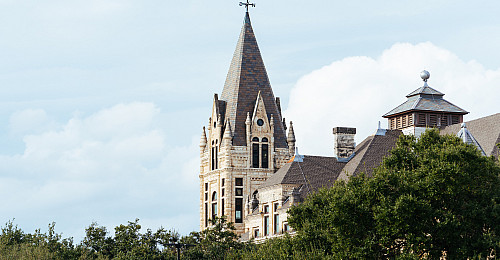News
Undergraduate STEM Research Provides Valuable Experience
SCOPE summer research projects teach patience, persistence and effective failure
August 07, 2017
August 07, 2017
Open gallery

SCOPE is an eight-week, student-faculty collaborative summer program that provides opportunities for Southwestern students to participate in research and investigative learning. Not only do SCOPE Scholars gain hands-on experience, but they also gain valuable insights in diversity, persistence and collaboration.
This summer, 37 SU students participated in thirteen different SCOPE projects. Subjects ranged across multiple fields, from Kinesiology (“Pre‐exercise carbohydrate consumption for the average exerciser”) to Biochemistry (“Induction of apoptosis in yeast and transformed mammalian cells using small cell‐penetrating peptides”) to Computer Science (“Developing Artificial Intelligence for Video Games”) and more. All involved research that have the potential to impact their fields.
Recently I caught up with a few of the SCOPE Scholars in action. One group, under the guidance of Dr. Steve Alexander, Professor of Physics, was in a workshop on the edge of campus, diligently working on their wave-powered robot. Ryan Benner, Christina Nissen and Alexandria Trevino were encouraged after a recent success. After weeks of self-described failures, they finally had a win.
Effective Failure, Perseverance Pay Off
This group put in many hours designing a new type of aquatic robot that uses spring-powered fins to convert wave energy into forward movement. They described multiple attempts that didn’t go as planned, forcing them back to the drawing board to start over. “It’s a lot of trial and error, and a big lesson in perseverance,” Ryan explained. Alexandria and Christina agreed, reflecting on the hours spent testing in Lake Georgetown and the fountain on campus.
The project was a tremendous learning opportunity for the group, and there was another important concept that they took away from the experience – that it’s okay to fail. Innovation comes after a series of failed attempts, and this “effective failure” is one of the best ways to learn. That’s a concept that they’ll carry with them throughout their time at SU and beyond.
Patience, Persistence & Collaboration
Meanwhile, in a biology lab across campus, SCOPE Scholars Antonio Mendez, Athena Pinero and Chandler Hyatt were busy identifying the inhibitory factors of ICE391 responsible for attenuating RumA’2B mutagenic activity (and having a fabulous time, I might add!). I walked in to music playing and found all three intently working, handling the science equipment like pros. They were more than happy to talk to me about their research, and I swear Chandler’s face lit up when he discussed antibiotic resistance. They’re obviously passionate about the work they’re doing.
As they described their summer of research, I heard a familiar concept resurface. Just as the previous group talked about their repeated failures and the need for patience, the biology SCOPE students stressed the importance of persistence. They ran into repeated challenges harvesting and maintaining enough DNA fragments to do what they needed to do. They had to troubleshoot, identify the problem and develop an effective solution.
It was frustrating, but fortunately they weren’t in it alone. Associate Professor of Biology, Dr. Martin Gonzalez, or “Dr. G” as they affectionately call him, was there to guide the group. He continuously encouraged them to view things from a different angle or perhaps try something another way, mindful never to solve the problems for them. “He is so passionate about this research, and his knowledge is incredible,” described Athena. “Dr. G is a walking encyclopedia, so having the opportunity to spend the summer learning from and working alongside him is an invaluable experience. I’m so grateful I applied and was chosen to do this.”
Athena added that before SCOPE she hadn’t even considered a career in research. However, after the experience she realized it can be truly rewarding and looks forward to continuing this research throughout her time at Southwestern – and possibly beyond. Antonio agreed, adding how the opportunity to put the concepts he’s learned in class into practice in a real lab setting and apply foundational knowledge to the procedures was a tremendous opportunity.
As the students became familiar handling the equipment and working in the lab their confidence increased, and this group’s sense of camaraderie was evident. In just eight weeks they’ve developed plenty of inside jokes and are already finishing each other’s sentences. It’s easy to see how SCOPE turns students into lifelong friends.
SCOPE Provides Valuable, Lifelong Skills
SCOPE provides Southwestern students the valuable opportunity to collaborate with faculty members while working on meaningful research. Although different in subject matter, the projects have several important things in common. Each one included unique challenges, collaboration with faculty, and meaningful research opportunities. The students not only increased their knowledge and abilities, but learned the importance of patience, perseverance and collaboration. Their confidence increased, and they developed relationships and skills that they’ll carry with them throughout their careers and life.
The eight-week program may be over, but the work is not. All SCOPE students will present their research at an open house event in the fall, and then again at Southwestern’s Research and Creative Works Symposium in spring 2018. In addition, some of the projects will continue into the fall and beyond.
These student projects were made possible through donations by several generous donors.
For a complete list of Summer 2017 SCOPE projects visit the SCOPE website or contact Julie Sievers, Director of Teaching, Learning, and Scholarships at sieversj@southwestern.edu for more information.














